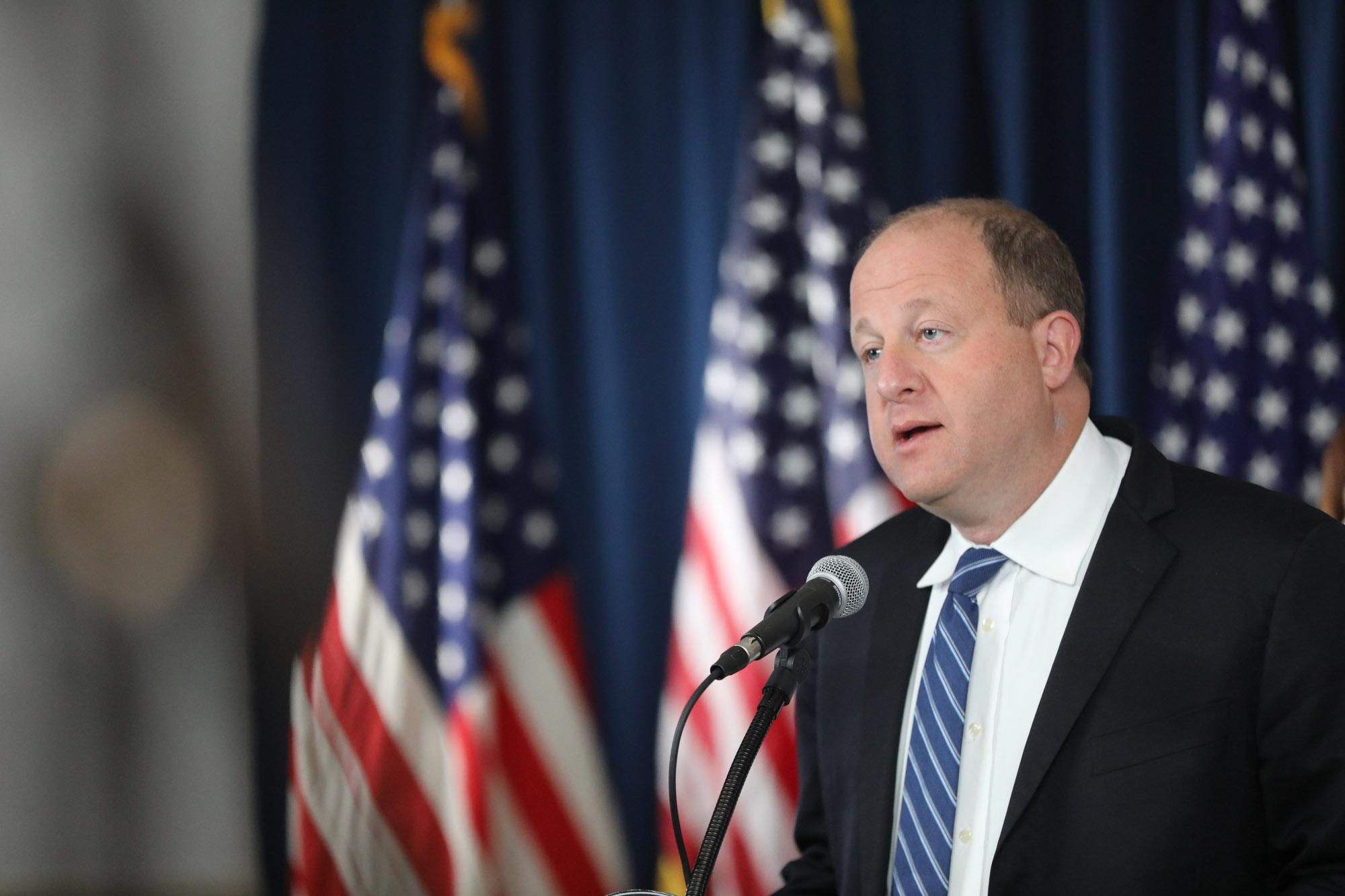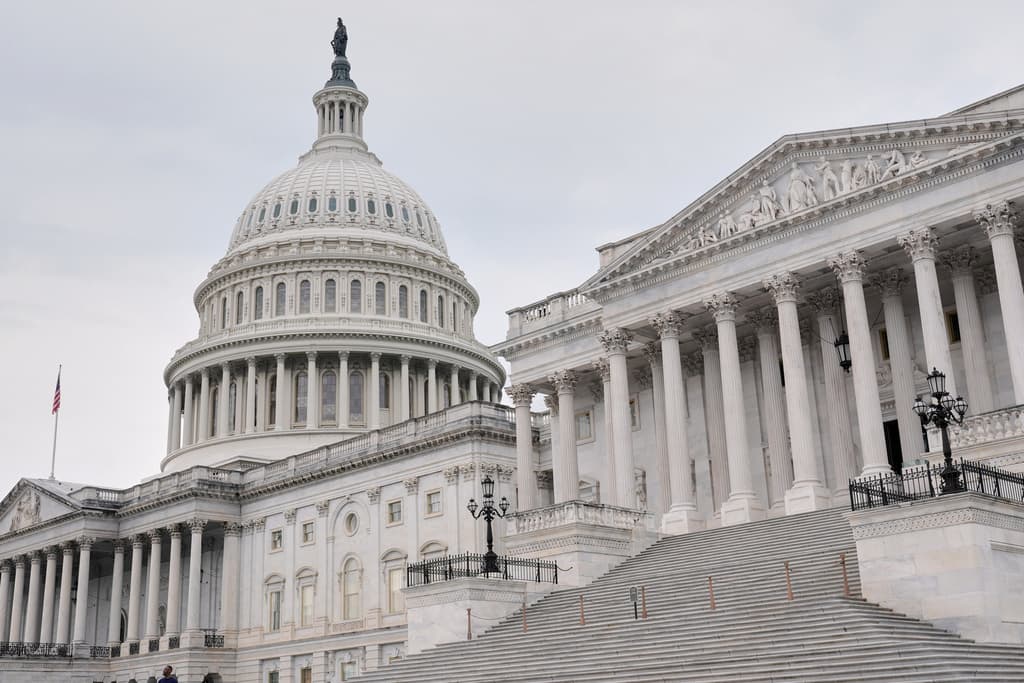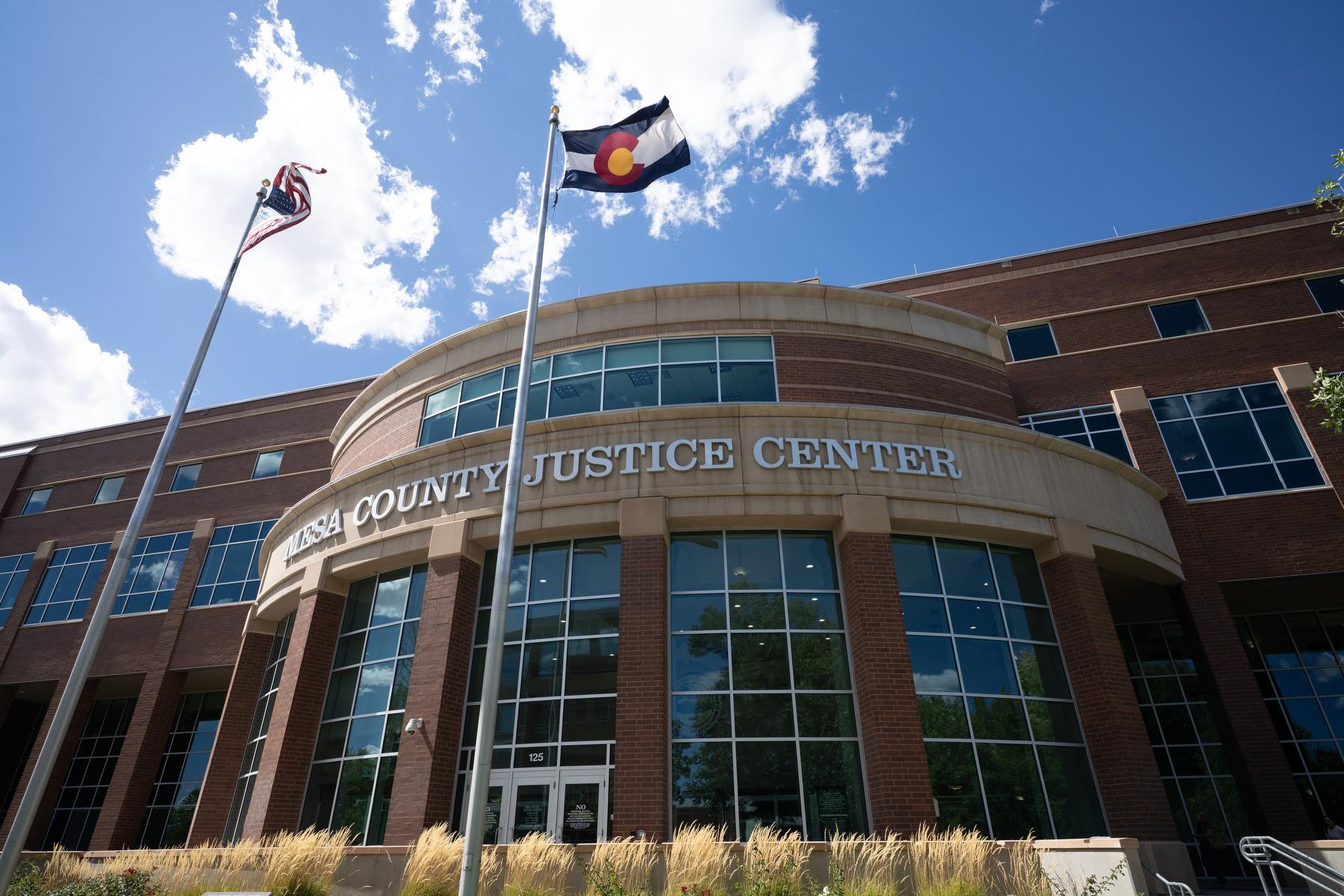
Before being elected to public office, Colorado Governor Jared Polis earned hundreds of millions of dollars as a tech entrepreneur. While serving in Congress before he became governor, he reported wealth that made him the third-richest member of the U.S. House.
According to a story published Thursday by the investigative news outlet ProPublica, Polis is one of many ultra-wealthy politicians who have leveraged tax law to pay significantly less income tax than many of their constituents. ProPublica reported that Polis did not pay income tax in 2013, 2014 or 2015.
When Gov. Polis joined Colorado Matters on Thursday for his regular check in with the show, host Ryan Warner asked about the ProPublica story. “I have paid all my taxes required by law,” the governor said. “To be clear, nobody is saying anything else. I also agree with the premise that the tax system favors the wealthy and big corporations.”
Polis offered some ideas for alternative taxes he said might yield more government revenue from the wealthy.
In the conversation, recorded over video call, Gov. Polis and Warner discussed how hospitals across Colorado are overburdened by COVID-19, the Governor’s plans for reelection and his thoughts on instituting broad tax reform to create a fairer system.
The following interview has been edited for clarity and length.
Ryan Warner: We will start with COVID. You have often said that hospital capacity is your north star in determining what mandates, or other steps, are needed to control the virus. The Colorado Hospital Association is now saying that there is a monumental strain on the system, as it took new steps to manage patient transfers. Governor, what are the next specific steps you will take to try and slow the spread in Colorado?
Gov. Jared Polis: We are at about 88 percent hospital capacity. Not great. And, normally you would like to be in the 70s, but not a hundred percent. We have to be very careful to make sure people are routed to the hospitals that have the space, have the room. Hospitals continue to do — at a slower pace, perhaps — procedures like knee surgeries and back surgeries. They are certainly still able to accommodate a certain number of those given the current caseload that they have. But, obviously, who wouldn't want to be at a lower number than 88 percent? But that's where we are today given the large number of unvaccinated folks that represent about 82 percent of the hospitalizations.
Warner: We heard earlier in the program from an infectious disease expert at St. Mary's in Grand Junction who is braced for a worse November in Mesa County. She says the vast majority of those hospitalized are un-vaccinated. Are there specific steps that you feel you need to take in the next weeks to prevent a — I don't want to overstate this — cataclysmic November and December.
Gov. Polis: The biggest thing that we are focused on is getting people vaccinated and protected, and the work continues on people getting their first and second doses, but you're going to a smaller and smaller group. I'm thrilled that there's 3,000 to 4,000 people a day still getting their first dose. That's wonderful news that there's lower hanging fruit on the booster shot for everybody after six months. I got mine. The data is just off the charts on the level of protection that it provides you. So for those listening, and if it has been six months after Moderna or Pfizer, or two months after Johnson & Johnson, get that booster.
The other new frontier we're so excited about: the 5- to 11-year-olds. As a father of a 10-year-old and a 7-year-old, I don't want them to get sick. It's often not as bad as adults, but nevertheless, there's 15 to 20 kids hospitalized for COVID almost every day in Colorado. I can't wait to get my two kids vaccinated. I plan to do it this weekend. And I encourage parents across the state who care about their kids, to get them vaccinated as soon as possible.
Warner: As I mentioned, you issued an executive order that could pave the way for crisis standards of care. Guidelines hospitals can use to determine who gets what, when resources are limited: be it ventilators, ICU beds. You haven't invoked those standards yet, but do you expect to?
Gov. Polis: The hospitals want to have it, and we have had it through most of the pandemic. It will be up to our Chief Medical Officer Dr. Eric France when to implement those. We are not anywhere close to being short of ventilators or anything like that. So, it wouldn't be about who gets ventilators. What it might be is when people are discharged, and exactly how they are giving care with nursing ratios and those sorts of things. If necessary, it will occur, because we are not going to overwhelm our hospital system. That's our commitment I make to the people of Colorado. We are at 88 percent, [but] we are not going to let it be a hundred percent. We're going to take steps — as we already have taken: we have requested FEMA teams coming in, we're trying to move the monoclonal antibodies out of hospitals into freestanding centers to free up space.
Warner: We asked for listener questions, as we often do. Ann Roehrig from Arvada asked, “I'm wondering what the rationale is behind enacting the crisis standards of care at hospitals, but not implementing a statewide mask mandate. We know that COVID is airborne, so why not use an easy and effective tool in our toolbelt that can combat the spread?”
Gov. Polis: Well, we know that masks can be effective in delaying people from getting COVID. Roughly 50 percent reduction is what a constellation of the data shows in the rate of transmission. And the reason that they aren't more widely deployed — and by the way, I encourage people to wear a mask indoors around others, especially if you're unvaccinated. But, even if you are vaccinated, it's a good step if you're in a crowded place, and certainly follow local mask orders.
Unlike last time around, where we did have to go with a statewide mask order, because it was the only tool we had. We have a much more effective tool, far more than 50 percent: the vaccine is [over] 90 percent effective. And there's an asterisk on that, Ryan, because it's really more than that. Yes, a mask can reduce the chance of you getting it 50 percent, vaccines can reduce the chance of you getting it to 90 percent.
But there's more to it, and here's what I mean: if you wear a mask and get COVID anyway, the case of COVID you get is just as bad as if you weren't wearing the mask. If you get vaccinated and have a breakthrough case of COVID, the case of COVID is much less severe and much less chance of hospitalization or death. It doesn't render you invulnerable, but it increases your odds tenfold. And of course, wearing a mask is a good idea, but getting vaccinated is exponentially more important to protect yourself.
Warner: You said in a press conference this week, that people who are not vaccinated have a “death wish.” And it made me think of an op-ed I saw out of Boston proposing that people who are not vaccinated pay more in health insurance premiums. Do you agree with that?
Gov. Polis: Well, I know that some companies are doing that to reflect the increased risk. I think rather famously Delta Airlines did that early on. They said, ‘fine, it costs us more to cover you. If you're not vaccinated, it's an extra 200 bucks a month.’ From an economic perspective, it's certainly reasonable that people bear their own costs of increased risks that they are taking, rather than socialize it across people that are already vaccinated.
Warner: Let's talk just a bit about vaccinating kiddos. On Wednesday, indeed, the FDA approved the Pfizer vaccine for those five to 11. To attend school, kids have to be vaccinated against a whole slew of diseases: diphtheria, measles, tetanus. Should COVID-19 be added to that list for school attendance at some point?
Gov. Polis: I am so excited to get the approval from [CDC] Director Walensky on Tuesday night. My kids are 10 and seven. They are getting vaccinated this weekend. I know that there's some parents out there trying to book their kids' appointments; They will get those in the next week or two. The first few days, a lot of the slots are filled, but generally people are finding [appointments] for next week. We're doing some large mass events over the weekends, and our goal is to vaccinate at least half of 5- to 11-year-olds with the first dose by the end of January. We're working with everybody from sports teams to zoos to do that.
I don't know where it's going with regard to what different school districts will or won't require. From our perspective at the state, and the epidemiological perspective, if we can reach 50 to 60 percent, that will make a major impact in reducing the transmission of the virus.
Warner: Let me point out, though, that the vaccine requirements for those other diseases emanate from state law. I'm pretty sure it was the CDPHE website that had the list of diseases that you have to be vaccinated against to attend school. Do you think it's the state's role to tell school districts this ought to be a proviso?
Gov. Polis: Well, in saying that Ryan, I think it's important to point out that it's more like a default of what you should get for your kids, but any parent can opt out of those as well. They simply sign a paper that they don't want their kids to have it. So in practice, 90 percent of kids have that set of vaccines, maybe 95 [percent] in some school districts. So if this one were being talked about as one of the recommended doses, of course parents would still be able to opt out.
Warner: But it doesn't sound like you would lead on that front, adding it to the list.
Gov. Polis: Well, the list though, you describe it as required. I just want to make sure your listeners know it's not required to attend school. It is the default, or recommended course of vaccines. My kids had them. I encourage every parent to get their kid vaccinated, but in practice in Colorado, somewhere between five and 10 percent of parents sign an exception for that.
Warner: Governor, ProPublica this morning released an investigation into your taxes under the headline, “How these ultrawealthy politicians avoided paying taxes.” And it found that in 2013, 2014 and 2015, you paid zero in federal income tax, and that you found strategies to keep your taxable income quite low around 8 percent. When you have paid, should you be paying more in federal income tax?
Gov. Polis: Well, first I think it's important to point out there's nothing that anybody has said in any article, other than that I have paid all my taxes required by law. To be clear, nobody is saying anything else. I also agree with the premise that the tax system favors the wealthy and big corporations. That's why I champion tax reforms for a better, fairer system. Including here in Colorado, where we actually delivered on reducing the income tax for every Coloradan then paying for that by closing loopholes that benefit corporations and the wealthiest. A several hundred million-dollar package that I was proud to sign, sponsored by representative Sirota and representative Weissman last year. So I think there's a lot of work to do, and we’re doing better at the state level, but I hope that the Democrats in Washington use the reconciliation package as an opportunity to make our tax system more fair.
Warner: Does that mean you want changes in federal tax law that would make you pay more? Is that what you're asking for?
Gov. Polis: Yeah, look, I think that income is not the best way to tax the wealthy. I mean, there's folks like Jeff Bezos and Elon Musk that will effectively never have income to tax because they have enormous gains; rather than recognize them, they can borrow against them.
I have long, probably, ruffled feathers in the Democratic party by saying, we have got to get rid of this income tax. Or, at least decrease it, because frankly it's not a good way to tax the very wealthy. And instead we should look at a number of different things: you could look at pollution tax, a wealth tax, a value-added tax. Most other countries have figured this out better. And I think one of the reasons that we — not the only reason, but one of the reasons you see this larger gap in our country between the super wealthy and everybody else is because of our unfair tax system.
Warner: What specifically, should you be paying more taxes on? That is to say, if you were to change federal tax law, how would you text yourself in a fairer system?
Gov. Polis: Lately I have been more focused on the state tax law, Ryan, and we did make some progress, but federal, again, I would say that income and capital gains tax are not a good tax to have. You can decrease them or get rid of them altogether; I'm fine with both. Here in Colorado, we have decreased the income tax twice — what do you replace that revenue with? I'm open to a wide variety of ideas, but generally they fall in three main categories. One is some kind of pollution or carbon tax, which has the added benefit of helping to save the planet — what a great idea. The second would be some kind of wealth tax, perhaps on property above a certain level or other assets. The third would be a value-added tax, which would simply tax money at each stage of transfer and transaction, and the wealthy would pay a significantly higher amount, regardless of whether they are making income or not as they purchase things or move things around.
So, it can be any one of those three. They are all better than the income tax, for sure. If your goal is to generate more government revenue in a more efficient way that doesn't discourage growth, like the capital gains and income tax do.
Warner: According to this investigation, charitable giving brings down your tax burden significantly, and that's not a surprise. But they find that some of that spending paid for mailers that had your name all over them, and had “the feel of a campaign ad.” This was while you were a member of the state board of education prior to running for Congress, did you use your charity to promote yourself?
Gov. Polis: Well, that's a very cynical view, Ryan. For me, my public service is a core value. I never thought it would necessarily take me into public office. I started my foundation and work, and I have a passion for improving our schools in Colorado. I have started two public schools. Obviously, Ryan, I didn't name those schools the Jared Polis School; They are called the New America School and Academy of Urban Learning. Unless folks dig into the history, they don't often know that I founded and served as superintendent of New America School. I also started Community Computer Connection, co-founded Patriot bootcamp to give veterans new job skills. I'm very proud of that work, frankly. If I never became governor, if I never became a Congressperson, those would be an even bigger part of the legacy of what I was trying to do to make Colorado an even better place.
Warner: You have filed paperwork to run for reelection. Can you confirm for me that you're running and if so, will you release your taxes?
Gov. Polis: Well, I think I filed the paperwork. I'm looking at probably doing a reelection tour in January or February and visiting different parts of the state and hearing from folks. I've already been getting out and meeting with folks. Just yesterday, I was in Pueblo, and I was in Salida the week before. In terms of reelection, I think the best thing that any incumbent should be doing is doing a good job. So, I strive every day to do a good job and hopefully that will be rewarded by the voters.
If you recall, Ryan, going back to 2018 I had an opponent that didn't release his taxes. I think all candidates should be held to the same standard and I support requiring candidates to make additional releases whether it's their taxes — or when I was in Congress, we had very lengthy disclosures of our assets, which was also something I supported..
But, it's also important to hold all candidates to the same standards. What I think doesn't work is if one candidate is doing it and another candidate isn’t. And so, I will look at that. I don't want any of that to be politicized, but I'm very happy to release everything that should be released by law.
Warner: So you will do it if they do it, I hear you saying. We have just a few minutes left, and I want to make sure we have time to talk about your proposed budget: a $40 billion proposal. This is just —
Gov. Polis: I would add by the way, Ryan, they have [my taxes] — almost de facto, but shared. Because somehow ProPublica has them and they reported on them. I know you haven't seen them and they are not out there, but obviously reporters have seen them and they have reported on them. So I just wanted to point that out there, too.
Warner: Thank you for that. To this $40 billion proposal. Again, the legislature will make the final choices, but beyond keeping the pandemic at bay, what is your single top priority, and why?
Gov. Polis: One of the things I'm most excited about, as a lifelong champion of public education, is we are increasing per-pupil student funding by $526 per student. One of the largest increases in history; highest per-people investment in history. What that means is, let's say a class of 25 students will have an additional $12,000 or $13,000 to invest in that classroom, whether it's teacher salaries, whether it's smaller class size, whether it's better resources.
We also know that our cities are struggling with increased homelessness: Denver, Aurora, Colorado Springs. And we want to make an investment in partnership with our cities to substantially reduce homelessness, providing increased opportunities for residential drug and alcohol treatment, mental health treatment, and make sure that our streets are safe and that we provide the best possible care to help people recover their dignity and move forward in a self-sufficient way.
Warner: Last year was one of the worst on record for ozone pollution, something you and I have talked about in the past, and you're proposing a program to help cut that $28 million to provide free public transit on bad ozone days. What evidence do you have that free tickets on transit will get people out of their cars?
Gov. Polis: We do have evidence from other places that have implemented this. Ozone is at its highest during our summer months, related to heat. So, let's say June, July, August, as an example. We would have a program with local transit agencies — could be your local bus agency, it could be RTD, it could be others. We will partner with them and provide some of the money for a free transit pass for that period of time, which absolutely will increase ridership during that period of time.
The real interesting question, Ryan, and what I hope also comes out of it, is lasting benefit beyond that. Meaning, once people get that habit and see how easy it is — for those who it is easy, if there's a bus route near where you commute or work. Will some of them remain riders once they are introduced to it on a free basis during the summer? There's a net benefit just during the ozone months alone to get those cars off the road. It will lead to cleaner air, but we're also hoping that it will inculcate that habitual use of public transit in a greater way.
We want public transit to be more convenient. It's important to invest in public transit. We did that through a house bill 260, our transportation and infrastructure bill, which is very transit-oriented for the entire state.
Warner: Governor. I want to thank you for your time and perhaps next time we can be face-to-face. Thanks for the remote connection.
Gov. Polis: Looking forward to it Ryan. Take care.
Related stories
- With Colorado hospitals overwhelmed, patients can now be transferred anywhere in the state
- The COVID vaccine will soon be available for 5 to 11 year-olds. Here’s what Colorado parents and kids say about it.
- Gov. Polis On Air Quality, Vaccinations And Masking In Schools
- Polis wants next year’s state budget to put more money into schools, unemployment and air quality









